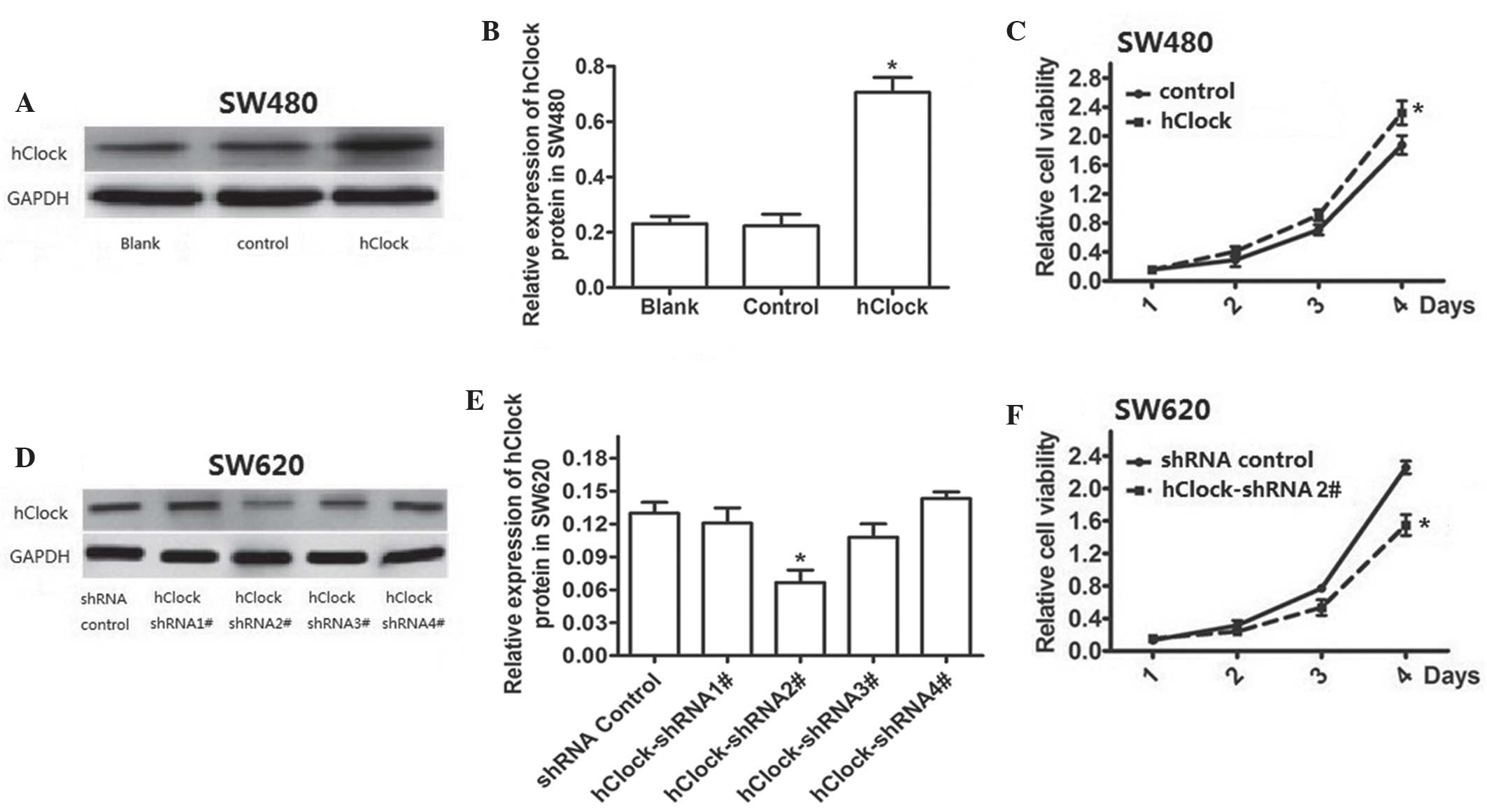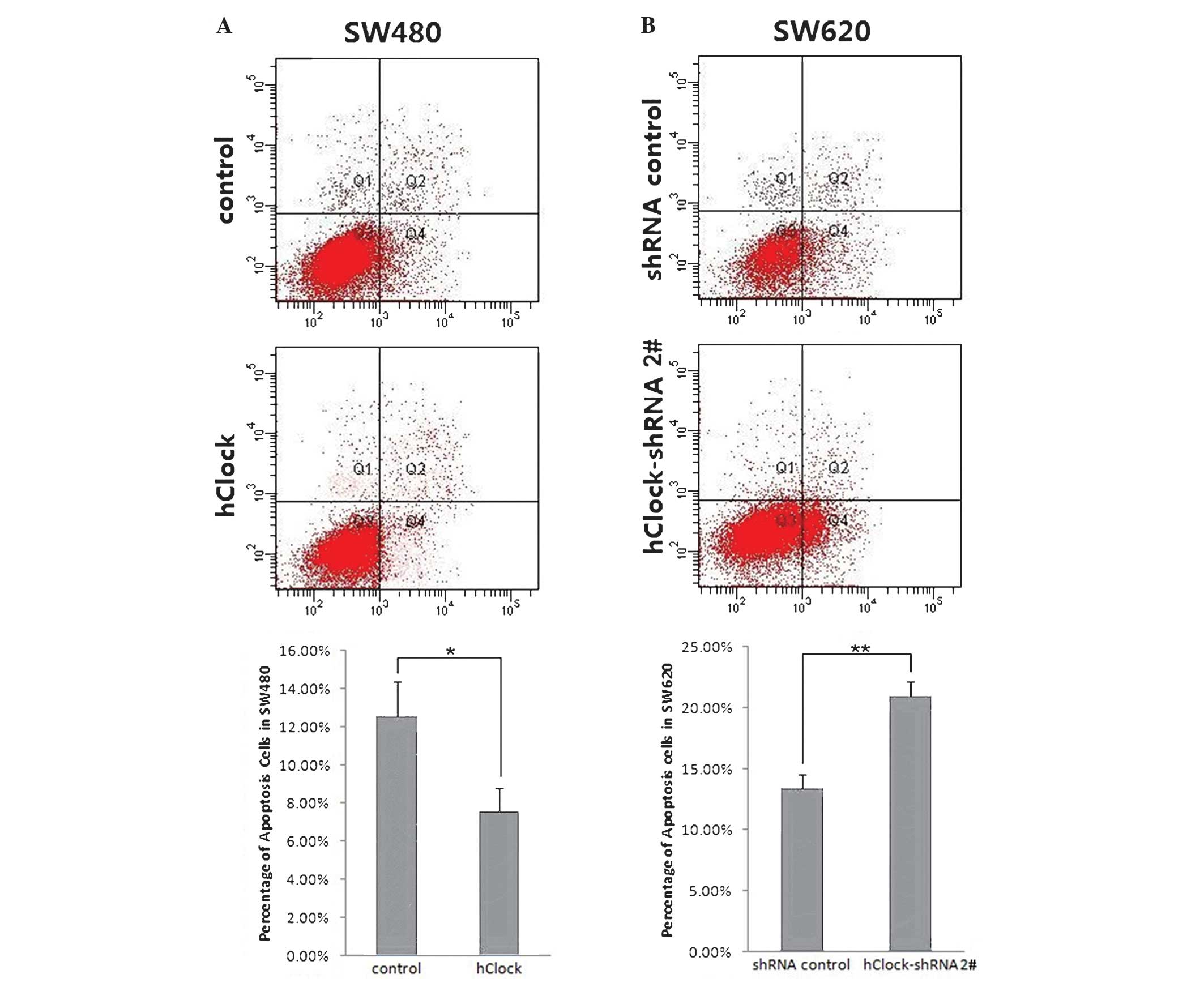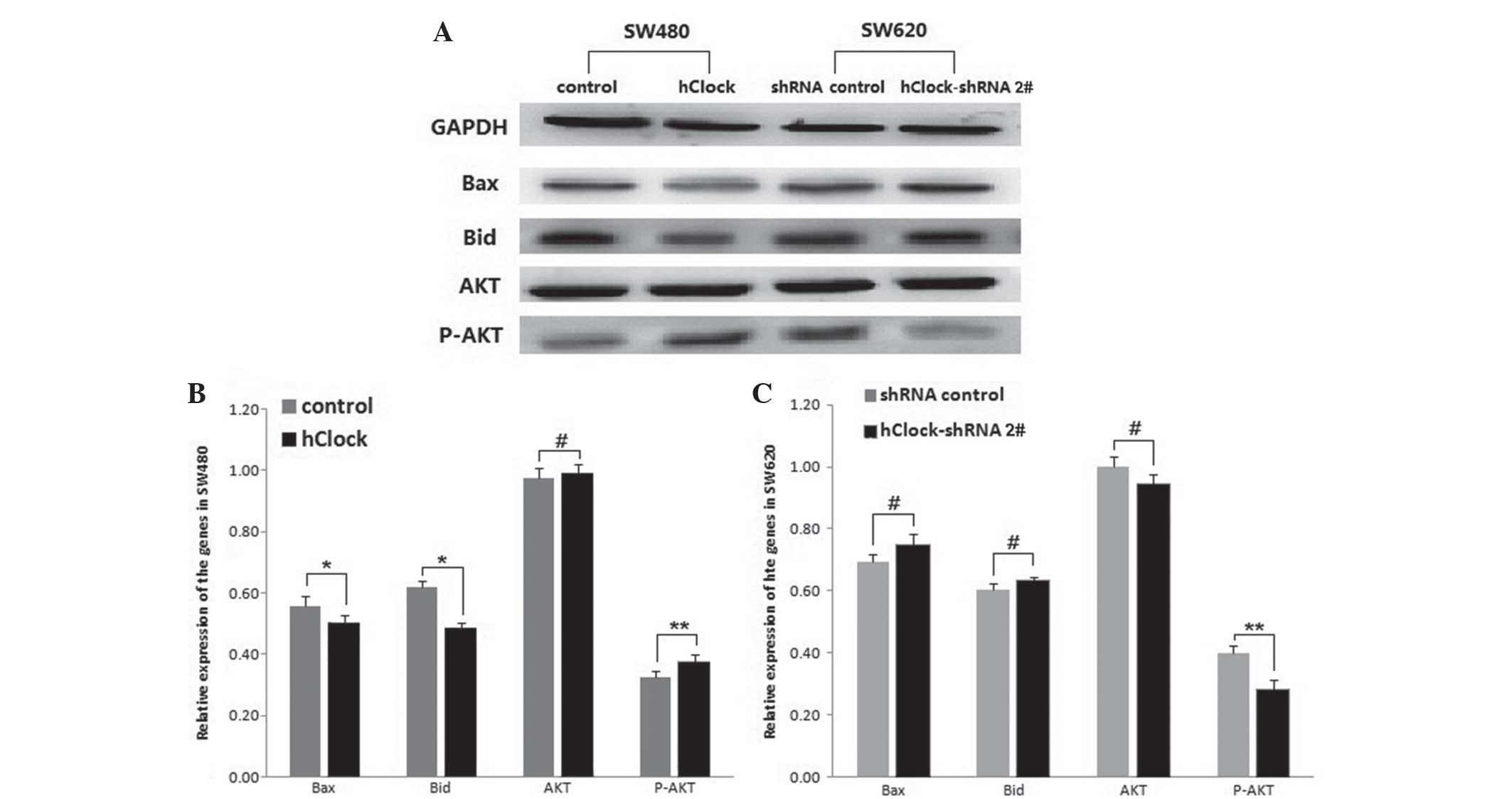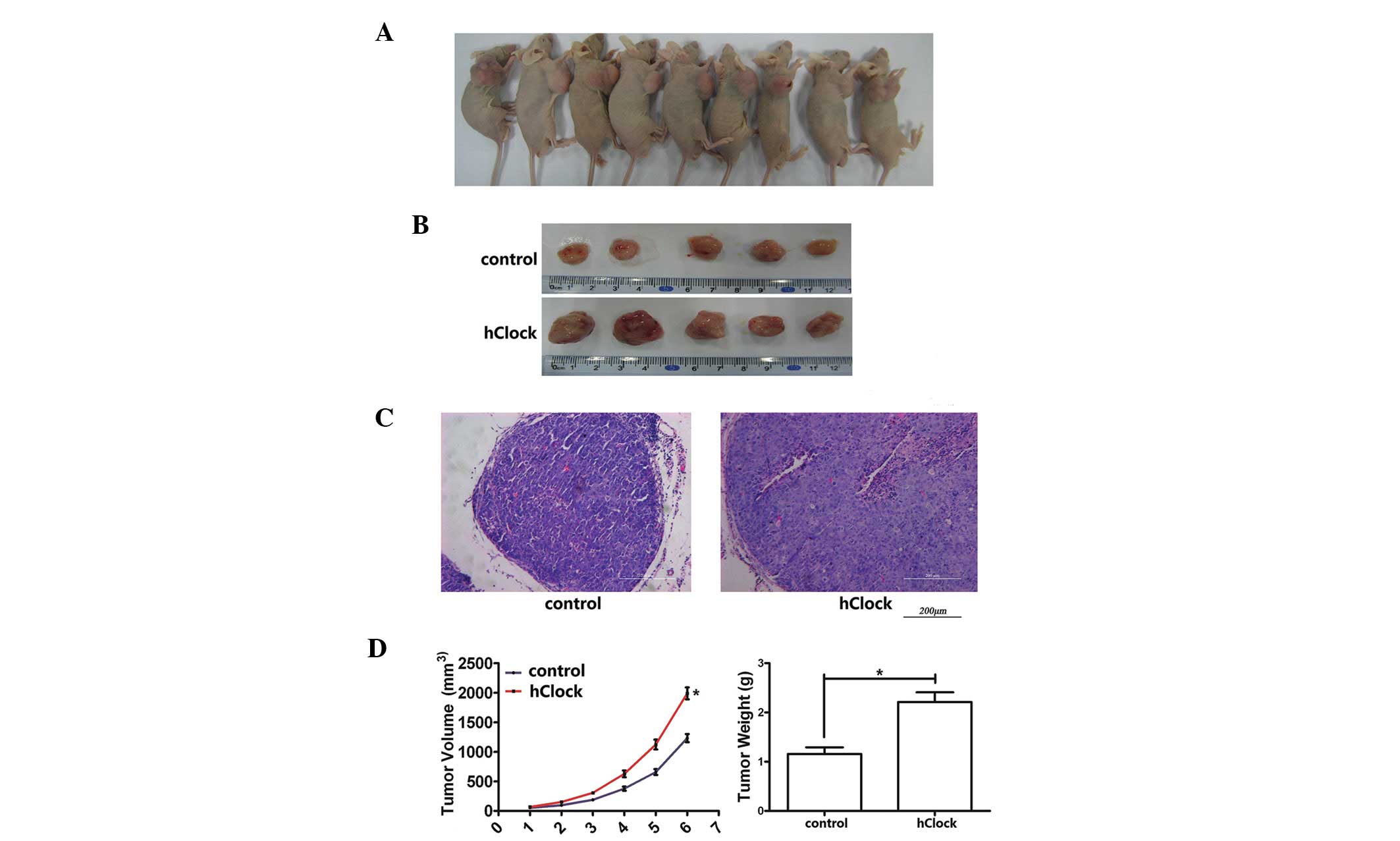|
1
|
Dibner C, Schibler U and Albrecht U: The
mammalian circadian timing system: organization and coordination of
central and peripheral clocks. Ann Rev Physiol. 72:517–549. 2010.
View Article : Google Scholar
|
|
2
|
Chen-Goodspeed M and Lee CC: Tumor
suppression and circadian function. J Biol Rhythms. 22:291–298.
2007. View Article : Google Scholar : PubMed/NCBI
|
|
3
|
Ko CH and Takahashi JS: Molecular
components of the mammalian circadian clock. Hum Mol Genet. 15(Spec
No.2): R271–R277. 2006. View Article : Google Scholar : PubMed/NCBI
|
|
4
|
Doi M, Hirayama J and Sassone-Corsi P:
Circadian regulator CLOCK is a histone acetltransferase. Cell.
125:497–508. 2006. View Article : Google Scholar : PubMed/NCBI
|
|
5
|
Rey G and Reddy AB: Connecting cellular
metabolism to circadian clocks. Trends Cell Biol. 23:234–241. 2013.
View Article : Google Scholar : PubMed/NCBI
|
|
6
|
Savvidis C and Koutsilieris M: Circadian
rhythm disruption in cancer biology. Mol Med. 18:1249–1260. 2012.
View Article : Google Scholar : PubMed/NCBI
|
|
7
|
Hoffman AE, Yi CH, Zheng T, et al: CLOCK
in breast tumorigenesis: genetic, epigenetic and transcriptional
profiling analyses. Cancer Res. 70:1459–1468. 2010. View Article : Google Scholar : PubMed/NCBI
|
|
8
|
Chen ST, Choo KB, Hou MF, et al:
Deregulated expression of the PER1, PER2 and PER3 genes in breast
cancers. Carcinogenesis. 26:1241–1246. 2005. View Article : Google Scholar : PubMed/NCBI
|
|
9
|
Lin YM, Chang JH, Yeh KT, et al:
Disturbance of circadian gene expression in hepatocellular
carcinoma. Mol Carcinog. 47:925–933. 2008. View Article : Google Scholar : PubMed/NCBI
|
|
10
|
Mazzoccoli G, Piepoli A, Carella M, et al:
Altered expression of the clock gene machinery in kidney cancer
patients. Biomed Pharmacother. 66:175–179. 2012. View Article : Google Scholar : PubMed/NCBI
|
|
11
|
Yeh KT, Yang MY, Liu TC, et al: Abnormal
expression of period 1 (PER1) in endometrial carcinoma. J Pathol.
206:111–120. 2005. View Article : Google Scholar : PubMed/NCBI
|
|
12
|
Chen Z, Liu P, Li C, et al: Deregulated
expression of the clock genes in gliomas. Technol Cancer Res Treat.
12:91–97. 2013.
|
|
13
|
Fu L, Pelicano H, Liu JS, et al: The
circadian gene period2 plays an important role in tumor suppression
and DNA damage response in vivo. Cell. 111:41–50. 2002. View Article : Google Scholar : PubMed/NCBI
|
|
14
|
Soták M, Polidarová L, Ergang P, et al: An
association between clock genes and clock-controlled cell cycle
genes in murine colorectal tumors. Int J Cancer. 132:1032–1041.
2013. View Article : Google Scholar
|
|
15
|
Jemal A, Bray F, Center MM, et al: Global
cancer statistics. CA Cancer J Clin. 61:69–90. 2011. View Article : Google Scholar : PubMed/NCBI
|
|
16
|
Fearon ER: Molecular genetics of
colorectal cancer. Annu Rev Pathol. 6:479–507. 2011. View Article : Google Scholar
|
|
17
|
Cancer Genome Altas Network: Comprehensive
molecular characterization of human colon and rectal cancer.
Nature. 487:330–337. 2012. View Article : Google Scholar : PubMed/NCBI
|
|
18
|
Wang L, Chen B, Wang Y, et al: hClock gene
expression in human colorectal carcinoma. Mol Med Rep. 8:2017–2022.
2013.
|
|
19
|
Oshima T, Takenoshita S, Akaike M, et al:
Expression of circadian genes correlates with liver metastasis and
outcomes in colorectal cancer. Oncol Rep. 25:1439–1446. 2011.
View Article : Google Scholar : PubMed/NCBI
|
|
20
|
Karantanos T, Theodoropoulos G, Gazouli M,
et al: Expression of clock genes in patients with colorectal
cancer. Int J Biol Markers. 28:280–285. 2013. View Article : Google Scholar : PubMed/NCBI
|
|
21
|
Alhopuro P, Björklund M, Sammalkorpi H, et
al: Mutations in the circadian gene CLOCK in colorectal cancer. Mol
Cancer Res. 8:952–960. 2010. View Article : Google Scholar : PubMed/NCBI
|
|
22
|
Zhou F, He X, Lui H, et al: Functional
polymorphisms of circadian positive feedback regulation genes and
clinical outcome of Chinese patients with resected colorectal
cancer. Cancer. 118:937–946. 2012. View Article : Google Scholar
|
|
23
|
Storch KF, Lipan O, Leykin I, et al:
Extensive and divergent circadian gene expression in liver and
heart. Nature. 417:78–83. 2002. View Article : Google Scholar : PubMed/NCBI
|
|
24
|
Bechtold DA, Gibbs JE and Loudon AS:
Circadian dysfunction in disease. Trends Pharmacol Sci. 31:191–198.
2010. View Article : Google Scholar : PubMed/NCBI
|
|
25
|
Levi F and Schibler U: Circadian rhythms:
mechanisms and therapeutic implications. Annu Rev Pharmacol
Toxicol. 47:593–628. 2007. View Article : Google Scholar : PubMed/NCBI
|
|
26
|
Sahar S and Sassone-Corsi P: Circadian
clock and breast cancer: a molecular link. Cell Cycle. 6:1329–1331.
2007. View Article : Google Scholar : PubMed/NCBI
|
|
27
|
Spengler ML, Kuropatwinshki KK, Comas M,
et al: Core circadian protein CLOCK is a positive regulator of
NF-κB-mediated transcription. PNAS. 109:E2457–E2465. 2012.
View Article : Google Scholar
|
|
28
|
Fu L and Lee CC: The circadian clock:
pacemaker and tumour suppressor. Nat Rev Cancer. 3:350–361. 2003.
View Article : Google Scholar : PubMed/NCBI
|
|
29
|
Ludwig JA and Weinstein JN: Biomarkers in
cancer staging, prognosis and treatment selection. Nat Rev Cancer.
5:845–856. 2005. View
Article : Google Scholar : PubMed/NCBI
|
|
30
|
Gery S and Koeffler HP: The role of
circadian regulation in cancer. Cold Spring Harb Symp Quant Biol.
72:459–464. 2007. View Article : Google Scholar
|
|
31
|
Vivanco I and Sawyers CL: The
phosphatidylinositol 3-Kinase AKT pathway in human cancer. Nat Rev
Cancer. 2:489–501. 2002. View
Article : Google Scholar : PubMed/NCBI
|
|
32
|
Adams JM and Cory S: Life-or-death
decisions by the Bcl-2 protein family. Trends Biochem Sci.
26:61–66. 2001. View Article : Google Scholar : PubMed/NCBI
|
|
33
|
Kiefer MC, Brauer MJ, Powers VC, et al:
Modulation of apoptosis by the widely distributed Bcl-2 homologue
Bak. Nature. 374:736–739. 1995. View
Article : Google Scholar : PubMed/NCBI
|
|
34
|
Bellacosa A, Chan TO, Ahmed NN, et al: Akt
activation by growth factors is a multiple-step process: the role
of the PH domain. Oncogene. 17:313–325. 1998. View Article : Google Scholar : PubMed/NCBI
|


















